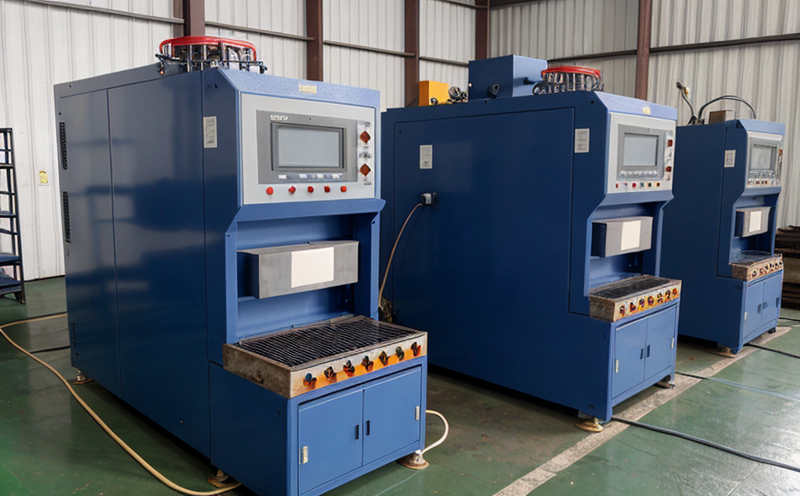GB T260 Petroleum Water Content Testing
The GB/T 260 method is widely recognized as a standard procedure for determining water content in petroleum products. This testing is crucial for industrial manufacturing and processing, particularly when dealing with raw materials like fuels, lubricants, and solvents. The process involves the distillation of the sample under vacuum to drive off any moisture present. Water vapor condenses on the cooled surface of the receiver, and the amount of water is determined by weighing the receiver before and after the test.
Industrial manufacturing processes often require high purity materials to ensure product quality and performance. Water contamination in raw petroleum products can lead to issues such as reduced fuel efficiency, increased wear on machinery, and even corrosion. By accurately measuring water content using GB/T 260, manufacturers can maintain strict quality control standards and ensure compliance with industry regulations.
The testing procedure is straightforward but requires precision equipment and techniques. The sample must be prepared according to the standard's specifications, which include proper labeling and handling to avoid contamination. Once prepared, the sample undergoes distillation in a water-sealed condenser under reduced pressure until no more water vapor can be driven off.
The apparatus used for this test includes a distilling flask, a vacuum line, a receiver, and a thermometer. The process is governed by ISO 12945-1:2017, which provides additional details on the equipment and procedures to ensure consistent results across different laboratories.
Accurate water content measurement is essential for several reasons in industrial manufacturing. It helps manufacturers understand the purity of raw materials, identify any contamination issues early, and adjust production processes accordingly. This testing can also help in optimizing storage conditions to prevent further moisture absorption by petroleum products.
In addition to its role in quality control, GB/T 260 testing is important for ensuring compliance with international standards and regulations. Many industries have strict limits on the water content allowed in their raw materials, and non-compliance can lead to penalties or product recalls. By using this standardized method, manufacturers can demonstrate their commitment to quality and regulatory adherence.
Why It Matters
The importance of GB/T 260 petroleum water content testing cannot be overstated in industrial manufacturing processes. Water contamination is a significant issue that affects the performance and longevity of many products, particularly those used in harsh environments or under high stress conditions.
- Enhanced Product Performance: By ensuring low water content, manufacturers can improve the efficiency and reliability of their products. This leads to better fuel consumption rates for transportation fuels and reduced wear on machinery components.
- Increased Durability: Reducing water in raw materials helps extend the shelf life and durability of finished products. For instance, lubricants with higher water content degrade faster, leading to increased maintenance costs and shorter product lifespans.
Furthermore, accurate testing ensures that manufacturers meet stringent quality control standards and regulatory requirements. This not only protects their reputation but also helps avoid costly recalls or legal issues.
The importance of this test extends beyond the immediate industrial application. It contributes to broader sustainability goals by minimizing waste and reducing the environmental impact associated with product failures due to water contamination.
Benefits
- Quality Assurance: Ensures that raw materials meet strict quality standards, leading to consistent product performance.
- Cost Efficiency: Reduces waste and maintenance costs by preventing premature product failure due to water contamination.
- Regulatory Compliance: Helps manufacturers adhere to industry regulations and avoid penalties or legal issues.
The benefits of GB/T 260 testing extend beyond the immediate industrial application. By ensuring high-quality raw materials, manufacturers can also contribute to broader sustainability goals by minimizing waste and reducing environmental impact associated with product failures due to water contamination.
Environmental and Sustainability Contributions
Water content in petroleum products is not only a quality issue but also has significant implications for the environment. Excessive moisture can lead to accelerated corrosion of metal components, which ultimately results in increased waste generation and higher emissions from repair and replacement processes.
- Emissions Reduction: By ensuring that raw materials are free from excess water, manufacturers reduce the need for additional treatment processes, thereby lowering greenhouse gas emissions.
- Risk Mitigation: Lowering water content in lubricants and other petroleum products can help mitigate risks associated with operational inefficiencies and safety hazards.
The GB/T 260 test plays a crucial role in promoting sustainable manufacturing practices. By identifying and addressing water contamination early, manufacturers can contribute to the reduction of environmental impact and support global sustainability goals.





